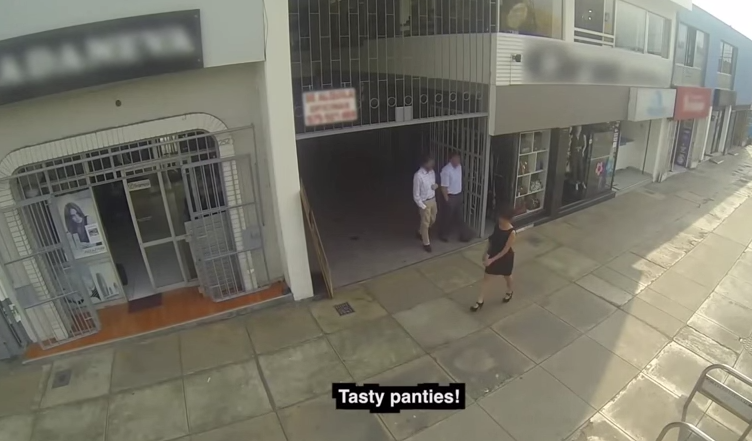This video has been hugely viral for months, but it's only recently that English speakers have begun to share it.
View this video on YouTube
It's actually a mockumentary by the sports brand Everlast and this campaign to stop street harassment.

The team played out dressing the abusers' mothers differently and disguising them...

...waiting for the men to start catcalling...

....and then giving them hell.

The campaign also features Natalia Málaga, a celebrated volleyball player and coach.
View this video on YouTube
Back in 2013 she and Everlast put this advert together, in which women drivers who were being harassed by men could tweet their location and she'd punch their cars with her own giant boxing-glove car. As this blog points out, it was all rather questionable on grounds of authenticity and indeed practicality, but it was a massive hit.
Here's a statement from Everlast Worldwide's marketing coordinator:
Everlast Peru is a brand firmly engaged in the fight for women’s rights. In 2013, with the viral video “El Guantazo,” we depicted the violence faced by women as they drive their cars in the city.
“El Guantazo” was a very successful video in Peru reaching more than 300.000 viewers in its first week on our YouTube channel.
In 2014, our commitment had to take a step further. That year a well-known Peruvian actress was the victim of sexual harassment while she was commuting on public transportation. This incident made Everlast Peru take a closer look at sexual harassment on the streets. Soon we found that this problem had become a common practice in our society and that this particular act ofviolence was primarily targeted at women. As the viral states, “7 out of 10 women in Lima have suffered from street harassment.” In a partnership with “Let’s stop street harassment”, a civil society group, we collected from different sources. After conducting several comprehensive interviews, we noticed that many of the male subjects had indeed once or twice “catcalled” by mistake one of their female family members, making them feel profoundly embarrassed about the situation. Hence we came up with “Catcall your mother” (“Silbale a tu madre”).
We chose the “fake documentary” format for this video mainly because -like no other- viewers empathize more with the storyline. We did not want to cause huge family rifts, particularly between a mother and a son once the action finalized as this would be a “low blow” and unfair to the son. We wanted to provoke, not cause harm.
This very same year 2014, two bills were introduced to the Congress to stop street harassment in Peru; such bills are still pending enactment. This is why the final reflection of the video seeks to create awareness in our society and to support the group “Let’s stop street harassment” by collecting signatures to file once more the street harassment bill and prevent it from being neglected again.
Natalia Malaga, the ambassador of our brand and former volleyball Olympic medalist, was elected as the most influential female figure in Peru in 2012. Once again, she was casted by Everlast Peru to lead and defend women’s world with this video.
Two weeks after the video was released in local television, on November 23rd 2014, “Catcall your mother” had more than 3 million viewers on our YouTube channel, over 100 thousand shares in social media and 53 million reactions on Twitter, because of this “Silbale a tu madre” became the most successful viral in the history of Peru. To date, we have reached over 5 million viewers. The video has been translated into English, French, Korean and many other brands around the world have seen it as an example to follow.
We are truly honored that the video has gone beyond Peruvian borders. The international press in countries like Spain, USA, Canada, Japan, Korea, Mexico, Colombia, Ecuador, Chile, and Brazil, among others, have reported on this campaign which has proven to be “not so local” cause.


